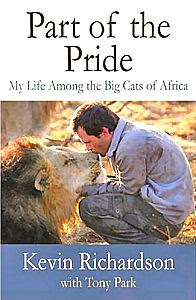 Kevin Richardson has a new book out now called Part of the Pride, a memoir in which he tells how he came to be "The Lion Whisperer".
Kevin Richardson has a new book out now called Part of the Pride, a memoir in which he tells how he came to be "The Lion Whisperer".Here's a short quote from early in the book, when Richardson was just being introduced to the lions at the Lion Park:
...We came to another enclosure containing two older cubs. At 6 or 7 months, they had reached an age where they could no longer be petted by visitors to the park, and they were big--much bigger than I had expected. One was called Napoleon and the other, which had yet to be christened, had the most incredible clear eyes.Oh, yes -- I'm going to like this book.
Conventional wisdom--or perhaps superstition--among lion keepers, I later learned, was that one should never trust a lion with clear eyes. Like a lot of things people told me about lions over the years to come, and like conventional wisdom in general, that little gem turned out to be bullshit.
Here are some other rules about lions that Richardson was told:
- Don't look them in the eye.
- Don't turn your back on them.
- Don't crouch or kneel or they will climb up on your back.
- Don't run.
- Don't make any sudden movements.
- Don't scream. Talk quietly.
Besides, lions, like cats, use the 'slow blink' as a means of letting you know everything is cool with them. You can't exchange this signal if you don't look them in the eye.
As for never crouching in the presence of a lion, click here to read what I learned from a very endearing lion.
I was so glad to see Richardson dismiss silly "conventional wisdom" as bullshit. So much of it is. He has learned through first hand experience how to treat animals, and he has been rewarded with some of the most wonderful animal friendships, even with animals others wouldn't go near.
I will definitely be reporting more from this book. Below is a short video of Kevin Richardson with some of his animals.




That's really interesting that lions do want humans to look them in the eye.
ReplyDeleteI always believed that it was dogs that wouldn't want that, and also that dogs could smell fear.
Is that true? If so, to what extent, and what is the mechanism involved?
Great material about becoming 'part of the pride'.
Well, I should emphasize that eye contact with a cat should involve the blink signal, to indicate friendliness; an unblinking stare can be interpreted as aggressive.
ReplyDeleteDogs are social animals; there's no reason you shouldn't make eye contact, especially if you want to establish a relationship with the dog. The context of the eye contact will let the dog know you are recognizing him. Some people will say that you shouldn't make eye contact with a strange or aggressive dog, but in such a situation with dogs, breaking eye contact indicates submission, so that could be dangerous for you when facing an aggressive dog.
Have a look at these pages:
http://www.veterinarypartner.com/Content.plx?P=A&A=1649&S=1&SourceID=47
http://hubpages.com/hub/Dog-Training-And-Eye-Contact
As for smelling fear... Maybe that's not strictly true, maybe it is. A dog's nose is many thousands of times more sensitive than ours, and it has been proven that they can smell cancer and diabetes, so maybe they can smell systemic changes we experience when we are afraid. Dogs are also very good at reading subtle body language, so we might give away our fear that way. Remember, when you act afraid, the dog assumes it has the upper hand and will feel free to do what it wants. I have seen one of my cats send a very large aggressive dog slinking away just by standing her ground and maintaining constant eye contact. She didn't even have to fluff up or hiss.
There is another reason people may say you shouldn't make eye contact with an animal: The first time you do it, the first time you really look and actually realize that behind those eyes there is a real thinking, feeling personality, it can be scary. All the things we've been taught about human superiority crack and fall away, and you actually feel naked. It's like many people have said: their eyes pierce through to your soul.
I am aware that dogs smell seizures and pick them up in other ways. I wasn't so aware that they smelt cancer and diabetes. It's a very interesting subject, how dogs help us when we are ill (and in many other ways as well).
ReplyDeleteThanks for the story about the cat and how she reacted when the dog was afraid. I'll take that point about the blinking into context when next I see a cat I like.
That point in the last paragraph ... I'll have to go away and reflect on that one.